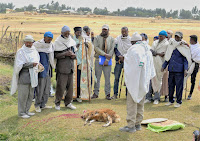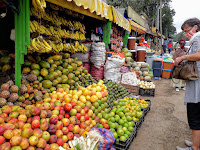One of the highlights of the field visits was a trip to a village near the town of Debre Berhan where I was able to see a traditional reconciliation ceremony. The partner that is responsible for promoting these events is the Ethiopia Mennonite Church (MKC) with whom we have several projects, but this peacebuilding activity is sponsored by their Prison Ministry Department.
I should preface this by saying that we had a visit with the leadership of the MKC the week before and met the leadership including the chair and leaders of their departments including the MK College, the theological school, the prison ministry, and their development wing called RDC. They welcomed me warmly, shared a fascinating history about the church, and the work they are doing.I was particularly impressed by the way they grew 10 fold secretly during the 'Durg" regime, a time of intense religious oppression and the closing of all churches in the 1980s. When the regime was finally overthrown, church membership was found to be 10 times what it was from the decade before.
MKC has a strong mission of service and has been developing projects and prison ministry for decades. Most of it has been done without outside foreign assistance.The gathering was also meant as a farewell for Bruce and Rose, and they were showered with gifts, praise, and ended with a socially distanced Ethiopian feast to honor them and welcome me.
In connection with the prison ministry work, we were invited, over the weekend, to visit a reconciliation ceremony to bring the families of a victim and an offender together in order to heal a community divided by a violent crime. On Saturday, I went with Rose, Solomon, and Wondwesen (two of our staff) to the town of Debre Birhan where we would stay the night before continuing on to the village where the ceremony would take place.
The trip to Debre Berhan was my first time out of the city on a trip. It was about 4 hours away, although much of that seemed to be getting from one end of Addis to the other. The countryside was generally hilly, and I was struck by the vast teff farms. (Teff is the grain staple of the Ethiopian diet and what injera bread is made from.) It was clear that harvest had happened recently and most fields were mowed or sythed and there were many high stacks of teff hay and farmers winnowing the cut sheaves on the ground near the stacks. Homesteads resembled Maasai bomas in many places with a number of small mud and wood huts gathered together enclosed by a wall. Debre Berhan is a medium-sized city with a University. What I noticed most though was that it was freezing cold and I was underdressed. We met our guides from the prison ministry at our hotel and had dinner with them and made plans for the next morning. The food and hotel were good cold weather notwithstanding, and I slept well.,The next day we got back in the Landcruiser and started a 70km trip down a dirt road to the place where the ceremony took place. Despite a slight delay because of a flat tire en route, we made it there in plenty of time.
The ceremony was to take place in the middle of a large field across a small gulch. It felt we were parking in the middle of nowhere. Our guide explained to us there that the ceremony involved reconciliation of the families of a victim who was murdered in a bar fight by two offenders. Apparently, the victim and perpetrators had not known each other but were drunk and got in a fight and the victim had been beaten to death. The offenders had been in prison for about 5 years so far. The prison ministry supports these ceremonies because of the traditional practice of honor killing: the expectation that a relative of the victim, an 'avenger of blood,' will kill the perpetrator when they get a chance. There is a lot of social pressure to avenge in this context. The purpose of the reconciliation ceremony is to end this cycle and bring the families back together to avoid further bloodshed.These ceremonies are officially recognized and the covenant signed between families is binding. In attendance at the ceremony are local govt. officials, community elders, and leaders of the Orthodox church. All bear witness to the signing of a reconciliation contract. Indeed I saw all of these members present. We were among the first to arrive but did see a small group of elders gathered, a peace committee who had convened the reconciliation and had spent the months before negotiating a settlement between families. Next to arrive were local priests from the Orthodox church. From a distance I saw a procession arriving, all wearing white, I was told it was the offender's family. They came bearing stones (part of the ceremony) and leading a live lamb. They settled on one side of the small gulch. Next, the victim's relatives arrived. Both sides sent representatives to the group of elders. An agreed restitution payment was made then the ceremony continued. Notably, the offender himself could not be present because he was still in prison, so his family was acting on his behalf. The reconciliation ritual has several components. First, the offender's clan comes to the edge of the gulch bearing stones (of guilt?). The victim's family steps across and takes the stones from them and puts them on the ground. Then the offender's clan crosses the gulch with the lamb. The lamb is ritually killed with a member of the offender's clan holding the lamb and a member of the victim's clan cutting its throat. After the lamb is slaughtered it is cut up to be eaten together. The offender's clan also brought huge loaves of traditional bread, and (ironically) large quantities of locally brewed wine and brandy to be shared together.It was quite a spectacle to see all of these elements performed in front of my eyes, and I was honored to be able to watch from the sidelines. Happily, I did not seem to be a distraction at all, perhaps because this is a very public event attended by many outside the community to witness it. At the end of the ceremony, there was a signing of the covenant by a representative for each family, the local govt., and religious leaders. Once that was done, we headed back to Addis.We took a different route back to the city which was helpful to see other parts of the country and stopped for lunch at a small touristy resort in a small town for a late lunch before arriving back to Addis in the afternoon.
In the following days, I was able to take in another partner visit to a project sponsored by another Protestant church which provides tutoring to vulnerable children and empowers women suffering from HIV/AIDS with income-generating opportunities and savings groups.















